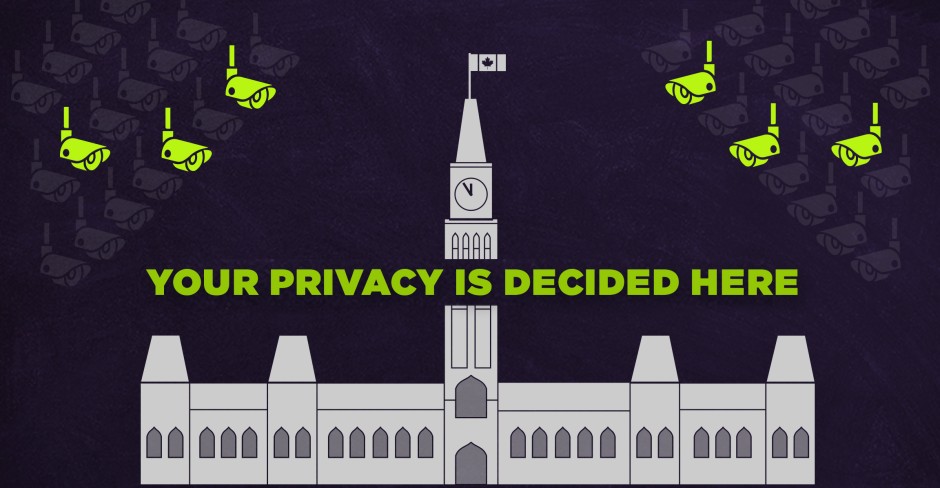C-59: Taking Action to Stop the Spying
Right now, critical reforms to National Security legislation are being discussed by Parliamentary committee. But the reforms need some major fixes for our digital rights to be properly protected.
The long-awaited next step in the journey to getting rid of Bill C-51’s invasive spying has come: The Standing Committee on Public Safety and National Security is reviewing the C-59 reforms and hearing from a range of experts on how the bill should be improved.
Together, we’ve been fighting for an end to the reckless and invasive surveillance brought in by Bill C-51 since the very beginning. And with the reforms brought in by Bill C-59, we’re closer than ever before. But more needs to be done to get us to the point where this could represent an effective repealing of C-51.
Every step of the way our actions have proven that when we act together, we have the power to make change happen. Here’s what we’ve accomplished together so far:
First, we protested:
311,346 people signed a petition to kill Bill C-51
Then, we fought for consultations (and won!):
40 organizations stood together and demanded a consultation on C-51
We rallied to get our voices on the record:
15,596 OpenMedia supporters submitted pro-privacy comments to the National Security Consultation through OpenMedia’s tools
Then we fought for transparency (and won!):
35 organizations signed a joint letter, and 140 Canadians called their MPs demanding the consultation results be made public
And together, we held the government to account:
OpenMedia supporters evaluated 13,236 comments submitted to the National Security Consultation through our crowdsourcing platform - showing clear evidence that a huge majority of Canadians wanted the full repeal of Bill C-51 and wanted their privacy protected.
Bill C-59 makes some meaningful and necessary improvements to Canada’s national security regime, but falls short of reversing the legacy of Bill C-51. To make that happen, we need to use our collective voices and send a strong message to the committee.
There are three key areas that we need to fix to make sure our privacy and digital rights are respected in these new reforms. The committee needs to hear our message loud and clear. Please join us in highlighting these important issues by sending in a letter here: https://act.openmedia.org/StopTheSpying
1. Address information disclosure provisions
The information sharing aspects of C-51 are the most concerning elements that remain unaddressed in C-59, and cannot be ignored.
To participate in modern life, we must share lots of information with our government. This information should not be repurposed into an open-ended intelligence dragnet.
The government must implement clear limitations on what information can be shared between government agencies, and how that information is managed and retained once shared. For example, limiting the use of information to the purposes requested, and limiting who can access information within other government agencies.
2. End the use of warrantless Stingray (IMSI-catcher) surveillance
The type of warrant currently needed to use a Stingray is simply too low. While police are keen to define the information collected by Stingrays as simple metadata, in reality this information can reveal sensitive information about individual people. We need a higher threshold of warrant, as well as clear restrictions on how long the data can be retained and used.
Our recent complaint launched into the use of Stingrays revealed how the RCMP violated the charter by deploying them six times without a warrant. And the Office of the Privacy Commissioner made specific recommendations around transparency and publicizing internal policies that should be immediately implemented.
3. Legislate protections for encryption
Encryption protects almost every element of our daily online lives, from private messaging on apps like Whatsapp to secure banking and online shopping.
However, the everyday security we depend on is at risk. Canada is a member of the Five Eyes intelligence alliance, which has recently agreed to work together to “address” encryption. Several member countries have made statements that they are seeking to engage with technology companies to find ways to give governments ‘backdoor’ access to private messages. In the face of these attacks on our privacy and digital security, Canada should create strong, proactive legislation, including legislative prevention of “backdoors” or “secret keys”.
Over and over again, we’ve proved that our pressure can hugely influence this process. Please join us in standing up for our rights and our privacy. We’ll be including all your letters in our submission to the committee so please send yours in now!


 Take action now!
Take action now!
 Sign up to be in the loop
Sign up to be in the loop
 Donate to support our work
Donate to support our work